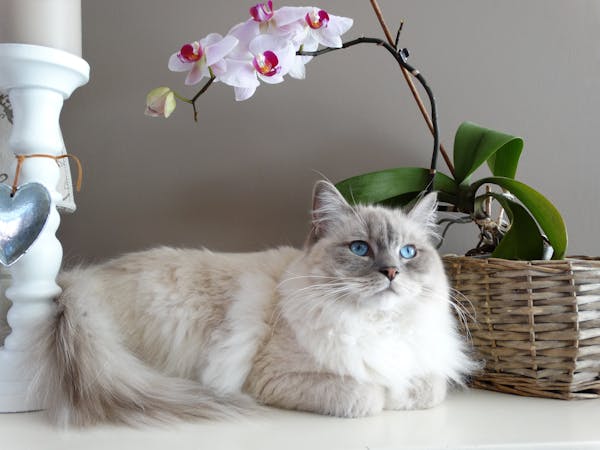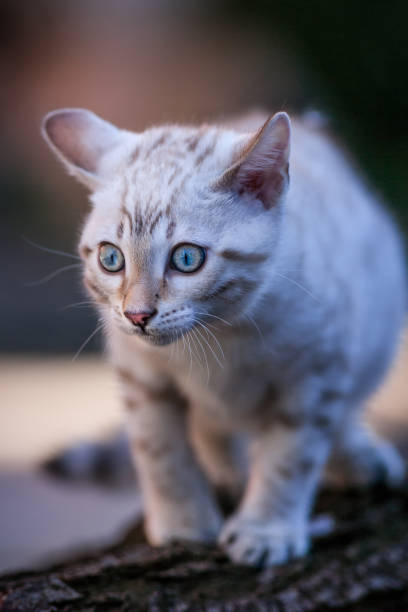Are Orchids Toxic to Cats? Many pet owners are concerned about the safety of their furry friends when it comes to houseplants. Among the popular options, orchids stand out for their beauty and elegance. But the question arises: are these stunning flowers safe for cats? Understanding the potential toxicity of orchids can help you create a safer environment for your feline companions while enjoying the aesthetic appeal of these vibrant plants.
How Dangerous Are Orchids for Cats?
Orchids are generally not considered dangerous for cats, as they are non-toxic to these pets. This means that if a cat happens to nibble on an orchid, it typically won’t suffer any serious harm. However, even non-toxic plants can cause mild gastrointestinal upset, such as vomiting or diarrhea, if ingested in large amounts. It’s also important to keep an eye on your cat’s behavior around plants, as curiosity can lead to other issues, like chewing on stems or leaves. While orchids are a safe choice, always ensure your home is a cat-friendly environment by monitoring any plants you bring inside.
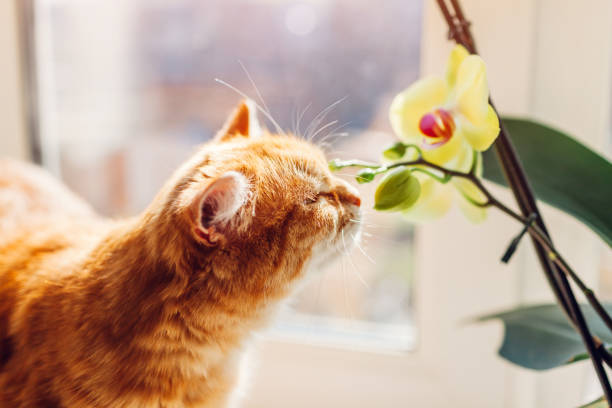
Can Cats Be Harmed by Any Orchid Varieties?
When considering whether cats can be harmed by any orchid varieties, it’s reassuring to know that most orchids are non-toxic to felines. Popular types like Phalaenopsis and Cattleya pose no significant risk to your cat’s health.Are Orchids Toxic to Cats? However, while orchids themselves are safe, it’s essential to be aware of potential irritants such as fertilizers or pesticides used on these plants
which could be harmful if ingested. Always check the specific care products you use on your orchids to ensure they are pet-safe. If your cat is prone to nibbling on plants, it might be wise to keep orchids out of reach or provide safe alternatives to satisfy their curiosity. By being mindful of both the plants and the care products, you can enjoy the beauty of orchids while keeping your furry friends safe.
Are Orchids Toxic to Cats?
Are Orchids Toxic to Cats? Cats are often drawn to orchids for several reasons, making these stunning plants a popular choice for pet owners. One factor is the appealing scent of orchids, which can intrigue a cat’s sensitive nose. Additionally, the texture and shape of orchid leaves may mimic natural playthings, enticing cats to explore and interact with them.
The vibrant colors of orchids can also stimulate a cat’s curiosity, prompting them to investigate further. Furthermore, the elevated positions where orchids are often placed may attract cats looking for new vantage points. Understanding why cats like orchids can help you create a more harmonious living space, ensuring your feline friend stays engaged and safe while you enjoy the beauty of these elegant plants.
What Should I Do If My Cat Eats an Orchid Flower?
If your cat eats an orchid flower, there’s generally no need to panic, as most orchid varieties are non-toxic to cats. However, it’s important to monitor your pet for any signs of gastrointestinal upset, such as vomiting or diarrhea. If your cat shows any unusual behavior or seems unwell, contact your veterinarian for guidance.
Are Orchids Toxic to Cats?To prevent future incidents, consider placing your orchids in locations that are out of reach or providing safe alternatives for your cat to play with. Always ensure that any fertilizers or pesticides used on your orchids are pet-safe, as these substances can pose a risk if ingested. By staying informed and proactive, you can keep your feline friend safe while enjoying the beauty of your orchids.
Most Orchids Are Safe for Cats: Tips to Stop Your Cat from Eating Your Orchid
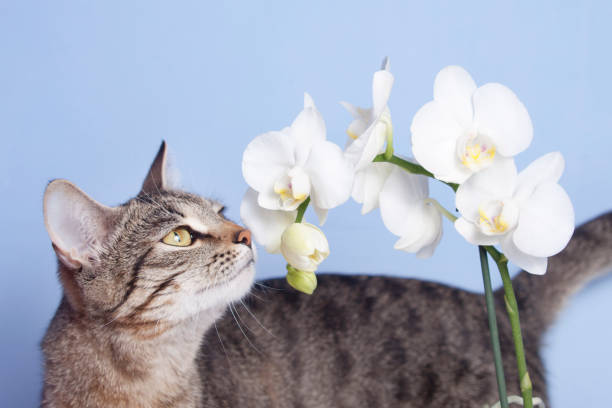
Most orchids are safe for cats, making them a popular choice for pet owners who love plants. However, if your feline friend shows an interest in nibbling on your orchids, there are several tips you can use to discourage this behavior. First, consider placing your orchids in areas that are elevated or hard to reach, ensuring they are out of your cat’s curious paws.
Are Orchids Toxic to Cats? You can also use deterrents like citrus-scented sprays, as many cats dislike citrus fragrances. Providing alternative plants that are safe for cats, such as cat grass or catnip, can also help redirect their attention. Additionally, engaging your cat with interactive toys and playtime can satisfy their curiosity and reduce the temptation to munch on your beautiful orchids. By following these tips, you can enjoy your orchids while keeping your feline companion safe and happy.
Why Does My Cat Chew on Houseplants?
Are Orchids Toxic to Cats? If you’ve noticed your cat chewing on houseplants, you’re not alone—this behavior is quite common among felines. Cats may nibble on plants for various reasons, including boredom or curiosity. Chewing on houseplants can also provide a source of fiber that aids in digestion and helps with hairballs. Additionally, the texture and movement of leaves may mimic natural prey, stimulating your cat’s hunting instincts. However, not all houseplants are safe for cats, so it’s crucial to ensure the plants in your home are non-toxic.
Providing your cat with safe alternatives, such as cat grass or catnip, can help satisfy their urge to chew while keeping them safe from harmful plants. By understanding why your cat chews on houseplants, you can create a healthier environment for both your pet and your greenery.
What Should I Know About Orchid Fertilizers?
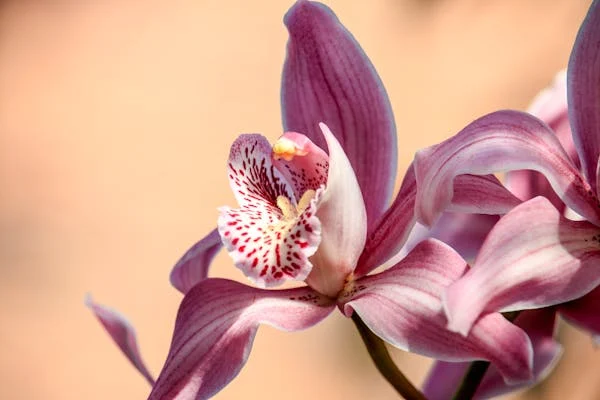
When it comes to caring for orchids, understanding orchid fertilizers is essential for promoting healthy growth and vibrant blooms. Most orchids thrive on a balanced fertilizer specifically designed for epiphytic plants, which often contain higher levels of nitrogen, phosphorus, and potassium. It’s important to choose a fertilizer that’s diluted to about half-strength to avoid overwhelming the delicate roots.
Are Orchids Toxic to Cats? Additionally, orchids typically benefit from feeding every two to four weeks during their active growing season, while reducing fertilization in the winter months when they enter dormancy. Always look for organic or slow-release options to minimize the risk of chemical build-up. By using the right orchid fertilizers and following these guidelines, you can ensure your plants remain healthy and produce stunning flowers year after year.
What Happens If My Cat Consumes Fertilizer?
If your cat consumes fertilizer, it can pose serious health risks depending on the type and amount ingested. Many fertilizers contain harmful chemicals and compounds that can lead to gastrointestinal distress, including vomiting, diarrhea, and abdominal pain. Some fertilizers may also contain toxic ingredients that can affect your cat’s central nervous system or cause more severe reactions. If you suspect your cat has ingested fertilizer, it’s crucial to seek veterinary care immediately. To prevent such incidents, always store fertilizers in secure, out-of-reach locations and consider using pet-safe alternatives. Being proactive about your cat’s environment can help ensure their safety while maintaining your garden or houseplants.
Conclusion
In summary, orchids are generally considered nonAre Orchids Toxic to Cats?, making them a safe choice for pet owners who want to incorporate these beautiful flowers into their homes. However, it’s always wise to monitor your pets around any plants and consult your veterinarian if you have any concerns. With a little caution, you can enjoy the charm of orchids while keeping your beloved cats safe and healthy.
4o mini
